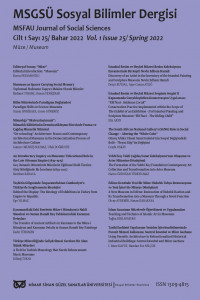Bir Kent Planlamak: Siyasi İktidarın Yüzleri Olarak Peyzaj
İktidar, iktidar ilişkileri, kentin düzenlenmesi, peyzaj, strateji, taktik
Planning a City: Landscape as the Visage of Political Power
Power, power relations, regulation of the city, landscape, strategy, tactics,
___
- Foucault, M. (1993). Cinselliğin Tarihi 1. (H. Tufan, Çev.) İstanbul: Afa Yayıncılık.
- Foucault, M. (2000). Entelektüellerin Siyasi İşlevi. (F. Keskin, Çev.) İstanbul: Ayrıntı Yayınları.
- Foucault M. (2005). Seçme Yazılar 2: Özne ve İktidar. F. Keskin içinde, Özne ve İktidar (s. 18). İstanbul: Ayrıntı Yayınları.
- Harvey, D. (2010). Postmodernliğin Durumu. (S.Savran, Çev.) İstanbul:Metis Yayınları
- Keskin, Ferda. (1997, Yaz). Foucault’da Öznellik ve Özgürlük. Toplum ve Bilim (73), s. 30-44.
- Lefebvre, H. (1991[1974]) The Production of Space, ( D. Nicholson-Smith. Çev) Oxford: Blacwell Publishers.
- Michel Certeau. (2009). Gündelik Hayatın Keşfi-I. (L. A. Özcan, Çev.) Ankara: Dost Kitabevi Yayınları.
- Shields, R., (1999), LeFebvre, Love, and Struggle: Spatial Dialectics, London: Routledge.
- Wacquant, L. (2004) Habitus, International Encyclopedia of Economic Sociology, (ed.) Milan Zafirovski, Londra: Routledge
- Başakşehir Belediyesi. (09.12.2013a). http://www.basaksehir.bel.tr/icerik/116 web sitesinden alınmıştır.
- Başakşehir Belediyesi. (09.12.2013b). http://www.basaksehir.bel.tr web sitesinden alınmıştır.
- Başakşehir Belediyesi . (09.12.2013c). http://www.basaksehir.bel.tr/icerik/2099?open=580 web sitesinden alınmıştır.
- Başakşehir Belediyesi. (09.12.2013d). http://www.basaksehir.bel.tr/icerik/102 web sitesinden alınmıştır.
- Başakşehir Belediyesi. (15.12.2013e). http://www.basaksehir.bel.tr/icerik/2099?open=580 web sitesinden alınmıştır.
- Başakşehir Belediyesi. (15.12.2013f). http://www.basaksehir.bel.tr/foto/663?open=534 web sitesinden alınmıştır.
- ISSN: 1309-4815
- Yayın Aralığı: Yılda 2 Sayı
- Başlangıç: 2010
- Yayıncı: Mimar Sinan Güzel Sanatlar Üniversitesi
Wilhelm Barthold’un Makaleleri IV Sistan, Afganistan’ın Güney Kısmı ve Belucistan
Roma Dönemi Duvar Resmi ve Mozaiklerde Akhilleus Skyros’ta Sahnesi: Efes, Pompeii ve Zeugma Örneği
B. Zaytsev’in “Keşiş Kronid” Öyküsünde “Etkileyici Anlatım” (Expressivity)
Bir Kent Planlamak: Siyasi İktidarın Yüzleri Olarak Peyzaj
Enformellik ve Cinsiyet Eşitsizliği Dolayımında İşgücü Piyasası Katmanlaşması
Türk Resminde Sembolist Eğilimler
Çağdaş Fotoğraf Sanatında Sinematografik Anlatı ve Gregory Crewdson Fotoğrafı
